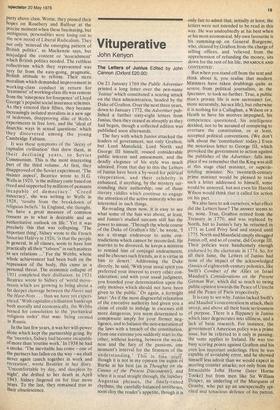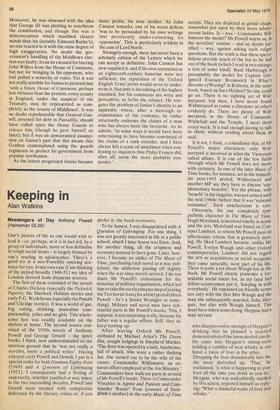Vituperative
John Kenyon
The Letters of Junius Edited by John Cannon (Oxford £20.00) On 21 January 1769 the Public Advertiser printed a long letter over the pen-name 'Junius' which constituted a searing attack on the then administration, headed by the Duke of Grafton. Over the next three years, down to January 1772, the Advertiser published a further sixty-eight letters from Junius, then they ceased as abruptly as they had begun, though a collected edition was published soon afterwards.
The fury with which Junius attacked the leaders of government, not only Grafton, but Lord Mansfield, Lord North and George III himself, roused considerable public interest and amusement, and the deadly elegance of his style was much admired. From that day to this the Letters of Junius have been a by-word for political vituperation, and their celebrity is enhanced, if anything, by the mystery surrounding their authorship; one of those literary riddles which continue to engage the attention of the active minority who are interested in such things.
Re-reading them now, it is easy to see what some of the fuss was about, at least, and Junius's studied sarcasm still has the power to amuse. 'Through the whole course of the Duke of Grafton's life', he wrote, 'I see a strange endeavour to unite contradictions which cannot be reconciled. He marries to be divorced, he keeps a mistress to remind him of conjugal endearments, and he chooses such friends, as it is virtue in him to desert.' Addressing the Duke directly, he said, 'With your usual spirit you preferred your interest to every other consideration; and with your usual judgment, you founded your determination upon the only motives which should not have been given to the public.' Or again, a fortnight later: 'As if the most disgraceful relaxation of the executive authority had given you a claim of credit to indulge in excesses still more dangerous, you seem determined to compensate amply for your former negligence, and to balance the non-execution of the laws with a breach of the constitution. From one extreme you suddenly start to the other, without leaving, between the weakness and the fury of the passions, one moment's interval for the firmness of the understanding.' Thrs. 'is fine stliff, though it is not in my opinion the equal or Burke at his best (as in Thoughts on the Causes of the Present Discontents), and when it is read straight through, the lapidary Augustan phrases, the finely-tuned rhythms, the carefully-balanced antitheses, soon cloy the reader's appetite, though it is only fair to admit that, initially at least, the letters were not intended to be read in this way. He was undoubtedly at his best when at his most economical. My own favourite is his summing-up on General Burgoyne, who, cleared by Grafton from the charge of selling offices, and 'relieved from the apprehension of refunding the money, sits down for the rest of his life, INFAMOUS AND CONTENTED'.
But when you stand off from the text and think about it, you realise that modern Ministers have taken drubbings quite as severe from political journalists, in the Spectator, to look no further. True, a public man's private life is now sacrosanct (or, more accurately, his sex life), but otherwise it is nothing for a Callaghan, a Wilson or a Heath to have his motives impugned, his competence questioned, his intelligence derided, nor to be accused of conspiring to overturn the constitution, or at least, accepted political conventions. (We don't talk about the 'constitution' today.) Even the notorious letter to George III, which provoked the government to action against the publisher of the Advertiser, falls into place if we remember that the King was still at this stage chief minister, or superintending minister. No twentieth-century prime minister would be pleased to read such a letter addressed to himself, some would be annoyed, but not even Sir Harold Wilson would think that it called for action on his part.
We also have to ask ourselves, what effect did the Letters have? The answer seems to be, none. True, Grafton retired from the Treasury in 1770, and was replaced by North, but to Junius's fury he returned in 1771 as Lord Privy Seal and stayed until 1775. North and Mansfield simply shrugged Junius off, and so of course, did George HI. Their policies were handsomely enough endorsed by the electorate in 1774. So, for all their fame, the Letters of Junius had none of the impact of the acknowledged classics of eighteenth-century polemics, like Swift's Conduct of the Allies or Israel Mauduit's Considerations on the Present German War, which did so much to swing public opinion towards the Peace of Utrecht and the Peace of Paris respectively.
It is easy to see why. Junius lacked Swift's and Mauduit's concentration in attack, their sweep, and above all their basic seriousness of purpose. There is a flippancy in Junius which later degenerates into silliness, and a lack of basic research. For instance, the government's American policy was a prime issue, but he referred to it only in passing; the same applies to Ireland. He was too busy scoring points against Grafton and his even less important underlings. Here he was capable of avoidable error, and he showed himself less adroit than we would expect in meeting counter attacks; not only from the formidable John Horne (later Horne ' Tooke) but from men like Sir William Draper, an underling of the Marquess of Granby, who put up an unexpectedly spirited and tenacious defence of his patron.
Moreover, he was obsessed with the idea that George III was plotting to overthrow the constitution, and though this was a misconception which muddied clearer minds than his (notably Edmund Burke's), no one reacted to it with the same degree of high exaggeration. No doubt the government's handling of the Middlesex election was faulty; it can be excused for barring John Wilkes from the House of Commons, but not for bringing in his opponent, who had polled a minority of votes. Yet it was not really sensible for J unius to pretend that 'with a future House of Commons, perhaps less virtuous than the present, every county in England, under the auspices oft he Treasury, may be represented as completely as the county of Middlesex'. It was no doubt reprehensible that General Gansell, arrested for debt in Piccadilly, should have called upon the Horse Guards to release him (though he gave himself up later); but it was an unwarranted assumption on Junius's part that this meant that Grafton contemplated using the guards regiments to protect his government from popular retribution.
As the letters progressed Junius became more prolix, his tone shriller. As John Cannon remarks, one of his worst defects 'was to be persuaded by his own writings into persistently under-estimating his. opponents'. This is particularly evident in the case of Lord North.
Strangely enough, there has never been a scholarly edition of the Letters which we can accept as definitive. John Cannon has. now supplied it, and if his own reputation as an eighteenth-century historian were not sufficient, the reputation of the 'Oxford English Texts' series would serve to underwrite it. Not only is his editing of the highest standard, but his comments are witty and perceptive, as befits the subject. He relegates the problem of Junius's identity to an appendix, where, after a thorough reexamination of the evidence, he rather reluctantly endorses the claims of a man who has always been the favourite. As he admits, 'In some ways it would have been entertaining to have become convinced of the claims of a rank outsider, and I have always felt a sense of anticlimax when confessing to inquirers that Philip Francis did, after all, seem the most probably contender.'



































 Previous page
Previous page